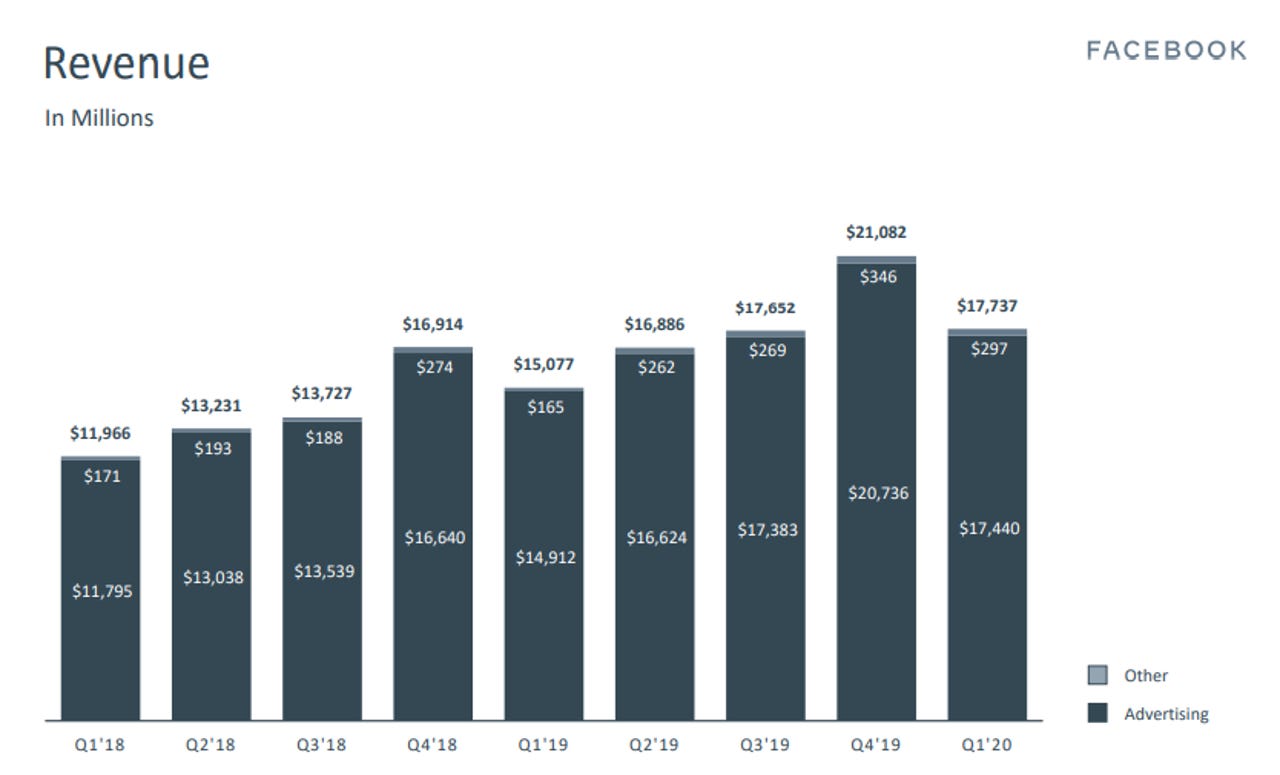Facebook reports mixed Q1 after taking ad revenue hit in March

Facebook managed to grow its year-over-year revenue by 18 percent in the first quarter of 2020, the company reported Wednesday, even after the COVID-19 pandemic resulted in a "significant reduction in the demand for advertising" in the last three weeks of the quarter. While demand dropped in March, Facebook said it saw "signs of stability reflected in the first three weeks of April."
On a conference call, CEO Mark Zuckerberg said of the pandemic, "The impact on our business has been significant."
Facebook's Q1 net income came to $4.9 billion, with earnings of $1.71 per diluted share. Revenue came to $17.74 billion, up 18 percent year-over-year.
Analysts were expecting earnings of $1.74 on revenue of $17.48 billion.

Due to the uncertainty created by the pandemic, Facebook is not providing revenue guidance for Q2 or for the full year 2020. However, it noted that advertising revenue in the first three weeks of April was approximately flat compared to the same period a year prior.
"The April trends reflect weakness across all of our user geographies as most of our major countries have had some sort of shelter-in-place guidelines in effect," Facebook said in a release.
The impact of the pandemic hasn't hit ad categories evenly, COO Sheryl Sandberg noted on a conference call. In spite of the crisis, Facebook saw strong ad growth in gaming, as well as stability in technology and e-commerce, she said. Meanwhile, there was a significant decline in advertising from the travel and auto sectors.
Facebook warned last month that the COVID-19 pandemic had been adversely affecting its ad business, even as it spurred increased user engagement on Facebook products.
Facebook's daily active users were 1.73 billion on average for March 2020, an increase of 11 percent year-over-year. Its monthly active users totaled 2.6 billion as of March 31, an increase of 10 percent year-over-year.
The number of people active daily on at least one of Facebook's products -- including Facebook, Instagram, Messenger and WhatsApp -- was 2.36 billion on average for March, an increase of 12 percent year-over-year. Monthly active people for Facebook products was 2.99 billion as of March 31, an increase of 11 percent year-over-year.
For the first time ever, there are now more than 3 billion people actively using Facebook, Instagram, WhatsApp or Messenger each month, Zuckerberg said on Wednesday's call. That includes 2.6 billion people using Facebook alone and more than 2.3 billion people using at least one of Facebook's services every day.
As shelter-in-place restrictions are relaxed in the future, "we expect that we will lose at least some of this increased engagement," Facebook said in its release.
"Our work has always been about helping you stay connected with the people you care about," Zuckerberg said in a statement. "With people relying on our services more than ever, we're focused on keeping people safe, informed and connected."
Meanwhile, Facebook expects to see its overall expenses this year continue to grow modestly, even as it saves on operational expenses like travel and marketing during the pandemic. The company plans to continue investing in product development and the recruitment of technical talent, and it has committed more than $300 million to investments in helping the broader community during the crisis. It now expects total expenses in 2020 to be between $52 billion and $56 billion.
Facebook expects to continue investing in global infrastructure this year, though it expects to see a significant decrease in construction globally. It now expects 2020 capital expenditures to be approximately $14 billion to $16 billion.
On Wednesday's call, Zuckerberg highlighted how Facebook has taken steps to support small businesses during the pandemic, as well as the products it's developing for SMBs. Small businesses that have already invested in their digital presence, he said, "are increasingly viewing them as their primary storefronts. So we're working on a number of ways to deepen this experience, helping people buy items and services directly within our apps. And we're going to have a lot more to share on this soon. Overall, though, our business depends on the success of small businesses, so this is a moment where we feel that we're well positioned to be champions for small business' interests and supporters of important infrastructure that they're going to need in order to move online."